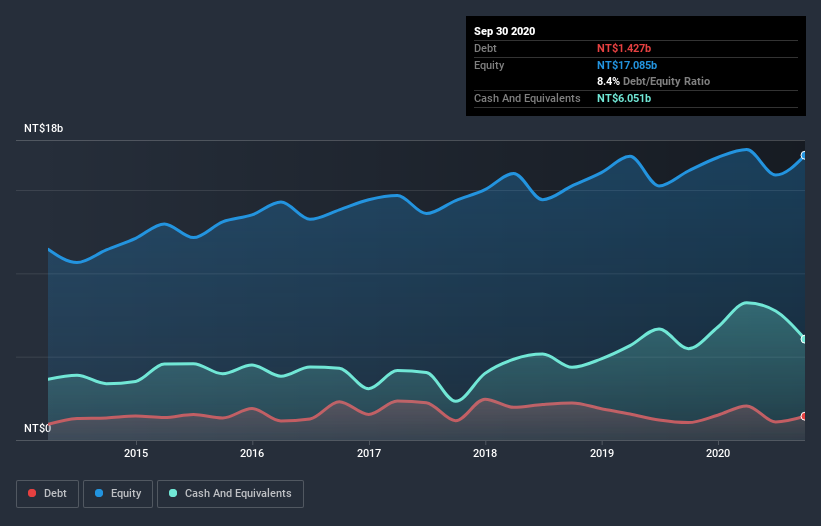These 4 Measures Indicate That Standard Foods (TPE:1227) Is Using Debt Safely

Howard Marks put it nicely when he said that, rather than worrying about share price volatility, 'The possibility of permanent loss is the risk I worry about... and every practical investor I know worries about.' It's only natural to consider a company's balance sheet when you examine how risky it is, since debt is often involved when a business collapses. As with many other companies Standard Foods Corporation (TPE:1227) makes use of debt. But is this debt a concern to shareholders?
When Is Debt Dangerous?
Debt and other liabilities become risky for a business when it cannot easily fulfill those obligations, either with free cash flow or by raising capital at an attractive price. Ultimately, if the company can't fulfill its legal obligations to repay debt, shareholders could walk away with nothing. However, a more frequent (but still costly) occurrence is where a company must issue shares at bargain-basement prices, permanently diluting shareholders, just to shore up its balance sheet. Of course, debt can be an important tool in businesses, particularly capital heavy businesses. When we examine debt levels, we first consider both cash and debt levels, together.
View our latest analysis for Standard Foods
What Is Standard Foods's Net Debt?
The image below, which you can click on for greater detail, shows that at September 2020 Standard Foods had debt of NT$1.43b, up from NT$1.05b in one year. But it also has NT$6.05b in cash to offset that, meaning it has NT$4.62b net cash.

How Healthy Is Standard Foods' Balance Sheet?
Zooming in on the latest balance sheet data, we can see that Standard Foods had liabilities of NT$7.39b due within 12 months and liabilities of NT$827.1m due beyond that. Offsetting these obligations, it had cash of NT$6.05b as well as receivables valued at NT$6.75b due within 12 months. So it can boast NT$4.59b more liquid assets than total liabilities.
This surplus suggests that Standard Foods has a conservative balance sheet, and could probably eliminate its debt without much difficulty. Succinctly put, Standard Foods boasts net cash, so it's fair to say it does not have a heavy debt load!
Also good is that Standard Foods grew its EBIT at 15% over the last year, further increasing its ability to manage debt. The balance sheet is clearly the area to focus on when you are analysing debt. But it is Standard Foods's earnings that will influence how the balance sheet holds up in the future. So when considering debt, it's definitely worth looking at the earnings trend. Click here for an interactive snapshot.
Finally, while the tax-man may adore accounting profits, lenders only accept cold hard cash. While Standard Foods has net cash on its balance sheet, it's still worth taking a look at its ability to convert earnings before interest and tax (EBIT) to free cash flow, to help us understand how quickly it is building (or eroding) that cash balance. Over the most recent three years, Standard Foods recorded free cash flow worth 77% of its EBIT, which is around normal, given free cash flow excludes interest and tax. This free cash flow puts the company in a good position to pay down debt, when appropriate.
Summing up
While we empathize with investors who find debt concerning, you should keep in mind that Standard Foods has net cash of NT$4.62b, as well as more liquid assets than liabilities. And it impressed us with free cash flow of NT$2.2b, being 77% of its EBIT. So is Standard Foods's debt a risk? It doesn't seem so to us. There's no doubt that we learn most about debt from the balance sheet. But ultimately, every company can contain risks that exist outside of the balance sheet. Consider risks, for instance. Every company has them, and we've spotted 1 warning sign for Standard Foods you should know about.
If, after all that, you're more interested in a fast growing company with a rock-solid balance sheet, then check out our list of net cash growth stocks without delay.
If you’re looking to trade Standard Foods, open an account with the lowest-cost* platform trusted by professionals, Interactive Brokers. Their clients from over 200 countries and territories trade stocks, options, futures, forex, bonds and funds worldwide from a single integrated account. Promoted
New: Manage All Your Stock Portfolios in One Place
We've created the ultimate portfolio companion for stock investors, and it's free.
• Connect an unlimited number of Portfolios and see your total in one currency
• Be alerted to new Warning Signs or Risks via email or mobile
• Track the Fair Value of your stocks
This article by Simply Wall St is general in nature. It does not constitute a recommendation to buy or sell any stock, and does not take account of your objectives, or your financial situation. We aim to bring you long-term focused analysis driven by fundamental data. Note that our analysis may not factor in the latest price-sensitive company announcements or qualitative material. Simply Wall St has no position in any stocks mentioned.
*Interactive Brokers Rated Lowest Cost Broker by StockBrokers.com Annual Online Review 2020
Have feedback on this article? Concerned about the content? Get in touch with us directly. Alternatively, email editorial-team (at) simplywallst.com.
About TWSE:1227
Standard Foods
Manufactures and sells nutritious foods, edible oil, dairy products, and beverages in Taiwan and internationally.
Flawless balance sheet with proven track record and pays a dividend.
Market Insights
Community Narratives



